A Cry for Gun Control: U.S. Students are warned against protesting
March 14, 2018
Survivors of the school shooting in Parkland, Florida and students across the country are demanding action from our government through protests after nineteen-year-old Nikolas Cruz opened fire and killed seventeen people.
A national debate was re-sparked about implementing gun regulations and this time students and adolescents are leading the discussion.
Emma Gonzalez, an eighteen-year-old student who survived the mass shooting at Stoneman Douglas High School, quickly became the face of the student movement after her heartfelt speech in front of the Broward County Courthouse went viral.
Gonzalez, along with fellow students David Hogg and Cameron Kasky, made it their mission to bring awareness on the importance of gun regulations to students across the nation, giving a voice to an underrepresented population when it comes to a legislature.
As students around the country follow their lead, questions are raised on how much participation will be tolerated by the school administration.
Curtis Rhodes, the superintendent of the school district in Needville, Texas has faced strong criticism after his letter written to students and parents was distributed saying that action would be taken against students if they decide to participate in the protests and walkouts.
“Should students choose to do so, they will be suspended from school for 3 days and face all the consequences that come along with an out-of-school suspension,” Rhodes said. “Life is all about choices and every choice has a consequence whether it be positive or negative. We will discipline no matter if it is one, fifty or five hundred students involved.”
The letter continued with Rhodes stating, “We are here for an education and not a political protest.”
Texas is not the only state where students were told disciplinary actions would be taken if they participated in any protests.
Steven Walts, the superintendent of schools in Virginia’s Prince William County, said, “PWCS [Prince William County Schools] recognizes your right to free speech and to protest, but these rights do not extend to disrupting classes or to leaving school. Students who cause disruptions or leave school without authorization will face disciplinary consequences, in keeping with the PWCS Code of Behavior.”
“It’s a quintessential First Amendment violation, and most Americans have an instinct about that,” Georgetown law professor Heidi Li Feldman told The Washington Post.
She is exactly right. Not allowing students the opportunity to walk out and participate in protests is a violation of their freedom of speech. As students, especially in high school and middle school, our voices are often limited. If students are passionate about a social issue, it is the responsibility of adults to ensure that they are able to express themselves and give their voice to the cause.
While that idea is not hard for many people to grasp, the problem arises as many faculty and parents believe students should not participate in anything that will hinder their education.
However, this is an important time in history concerning student activism and it is crucial for them to be on the front lines. As we have witnessed, if students and younger generations do not put pressure on government officials any change on any kind will come out of this tragedy.
EMPOWER, a youth branch from the people behind the national Women’s March will be organizing a national student walkout to protest gun violence in response to the mass shooting and controversy that has followed the events of Feb. 14.
“Students and staff have the right to teach and learn in an environment free from the worry of being gunned down in their classrooms or on their way home from school,” said the groups’ organizers.
As a result of the energy behind the movement, many school officials took notice and have addressed possible walkouts in a more positive way.
Public middle schools and high schools in Portland, Maine will be letting students participate in the national student walkout without fear of repercussions.
“We are proud that our students are passionate about advocating for their beliefs,” said Portland public school Superintendent Xavier Botana. “They have a powerful voice that can affect change and it is our role as educators to support them as they learn to apply democratic principles in action.”
Students should be allowed to participate in protesting when the protests are organized and nonviolent, such as the national walkout day.
By allowing and encouraging students to be active in politics, adults will help teach younger generations valuable lessons regarding government and democracy.
As college students and faculty, it is important to also lend our voices and provide an example for younger generations. While not everyone is able to protest, the importance of being aware and supporting those who are protesting is crucial on its own.
The nationwide walkout will be on March 14. where everyone is encouraged to walk out of the classroom at 10 a.m. for 17 minutes as a way to remember the 17 victims of the shooting in Parkland, Florida.





